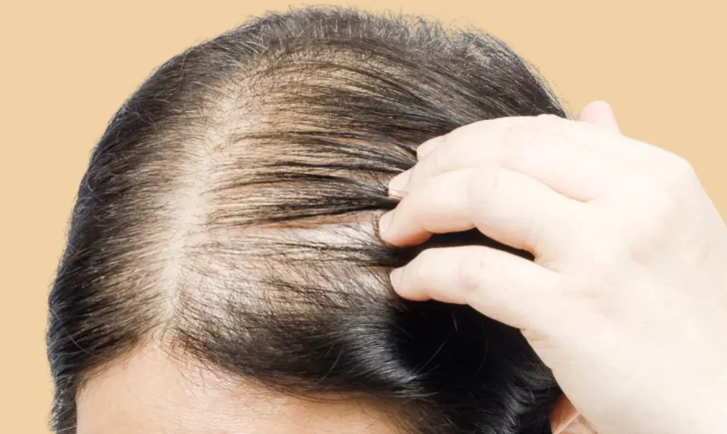WHAT ARE THE CAUSES AND TREATMENTS FOR HAIR LOSS?

What is hair loss?
Hair loss can affect just your appearance and mood, and it can be temporary or permanent. It can be the result of of genetics, hormonal changes, medical conditions, or normal parts of aging. Anyone can lose hair, but it's more common in men.Baldness is usually the loss of excessive hair from the scalp. Hereditary hair loss is the most common cause of baldness as we age. Some people prefer to let their hair loss run its course untreated and undisguised. Others may cover it up with hairstyles, makeup, hats or scarves. And still others choose one of the treatments available to prevent further hair loss or restore growth.
What cause hair loss?
Factors that can contribute to additional hair loss include:
Genetics:
The most common cause of hair loss is a hereditary condition that happens with aging. This condition is called androgenic alopecia, male-pattern baldness and female-pattern baldness. It usually occurs gradually and in predictable patterns-a receding hairline and bald spots in men and thinning hair along the crown of the scalp in women.
Poor nutrition:
Iron, folic acid, and other minerals all help follicles produce hair naturally.Lack of proper nutrition, particularly insufficient protein or iron in the diet, can contribute to hair loss.
Hormonal changes and imbalances:
Hormonal changes due to pregnancy, childbirth, menopause, or thyroid problems can contribute to hair loss.
Medical conditions:
Medical conditions include alopecia areata, which is immune system related and causes patchy hair loss, scalp infections such as ringworm, and a hair-pulling disorder called trichotillomania.Hair loss can be a side effect of certain drugs, such as those used for cancer, arthritis, depression, heart problems, gout and high blood pressure.
Experiencing chronic stress:
Physical or emotional stress can lead to temporary hair loss.Many people experience a general thinning of hair for months after a physical or emotional shock. This type of hair loss is temporary.Stress is associated with an uptick in hormones like cortisol. Too many stress hormones can trigger a condition like telogen effluvium, in which your hair can fall out, and the hair follicles enter a long “resting” phase where new hair doesn’t grow.
Hairstyles and Overtreatments:
Excessive hairstyles that pull your hair tight, such as pigtails or cornrows, can cause a type of hair loss called traction alopecia. Hot-oil hair treatments and permanents also can cause hair to fall out. If scarring occurs, hair loss could be permanent.Overtreating includes color treatments, perms.Don't use extreme-hold hair sprays and gels.Excessive treatments like using hot rollers, straightening irons, and hot oil treatments can cause inflammation of the hair follicles leading to hair loss.
Treatment
Keep scalp loose:
Staying away from tight hairstyles that pull on hair and can lead to hair loss.
Consult a professional:
Visit a dermatologist or a trichologist to determine the cause of your hair loss. They can recommend appropriate treatment options based on your specific situation.
Healthy lifestyle choices:
Exercise regularly, and manage stress levels. These lifestyle factors can contribute to overall well-being and may help promote healthier hair growth.
Maintain a balanced diet:
Eating a well-balanced diet to ensure you're getting nutrients needed to support hair health.Stopping smoking, which can can worsen hair loss due to inflammation.
Gentle hair care:
Be gentle when washing and brushing your hair to avoid additional breakage. Use mild shampoos and conditioners, and limit the use of heat-styling tools.Washing hair with a gentle shampoo and using a moisturizing conditioner and detangler to help reduce breakage, split ends, and moisture loss.Wrapping your hair in a microfiber towel after washing to cut down on blow-drying time.Limiting the use of heat from hair tools, as high temperatures can weaken or damage strands.Avoiding at-home coloring or other chemical processes that are damaging to hair.
Consider topical treatments:
Some over-the-counter and prescription treatments, such as minoxidil, may help stimulate hair growth when applied to the scalp.
Explore medical options:
In some cases, prescription medications or procedures like hair transplant surgery may be recommended by your healthcare provider.
Embrace your look with confidence!Remember that hair loss does not define your worth. Embracing your natural appearance and seeking support from friends, family, or a support group can help you feel more confident and positive.When seeking hair loss treatment, you need to talk to a professional to understand the causes of your hair loss and treatment options.If you need a hair wig that can solve hair loss problems quickly, please feel free to contact us.










































